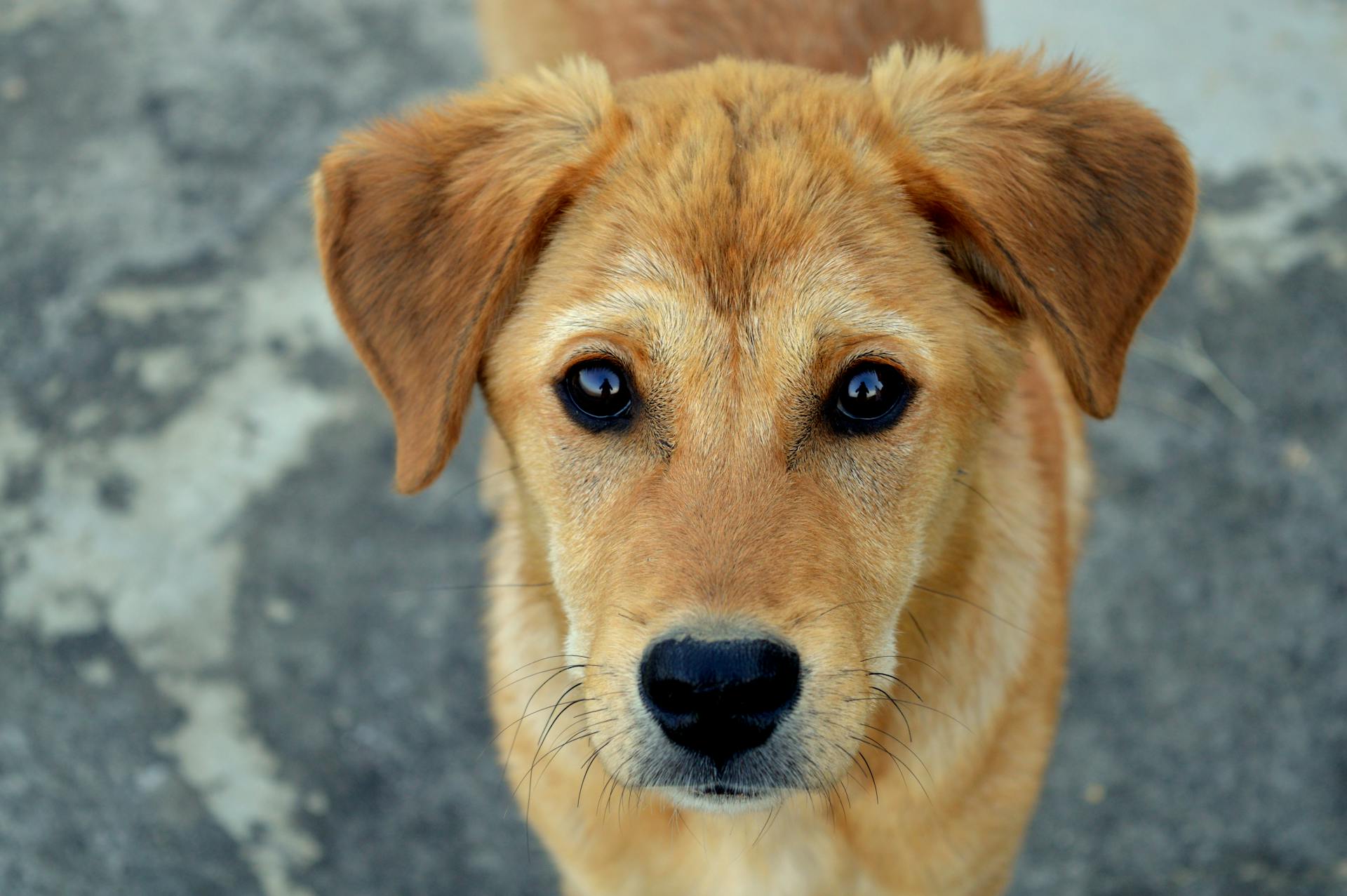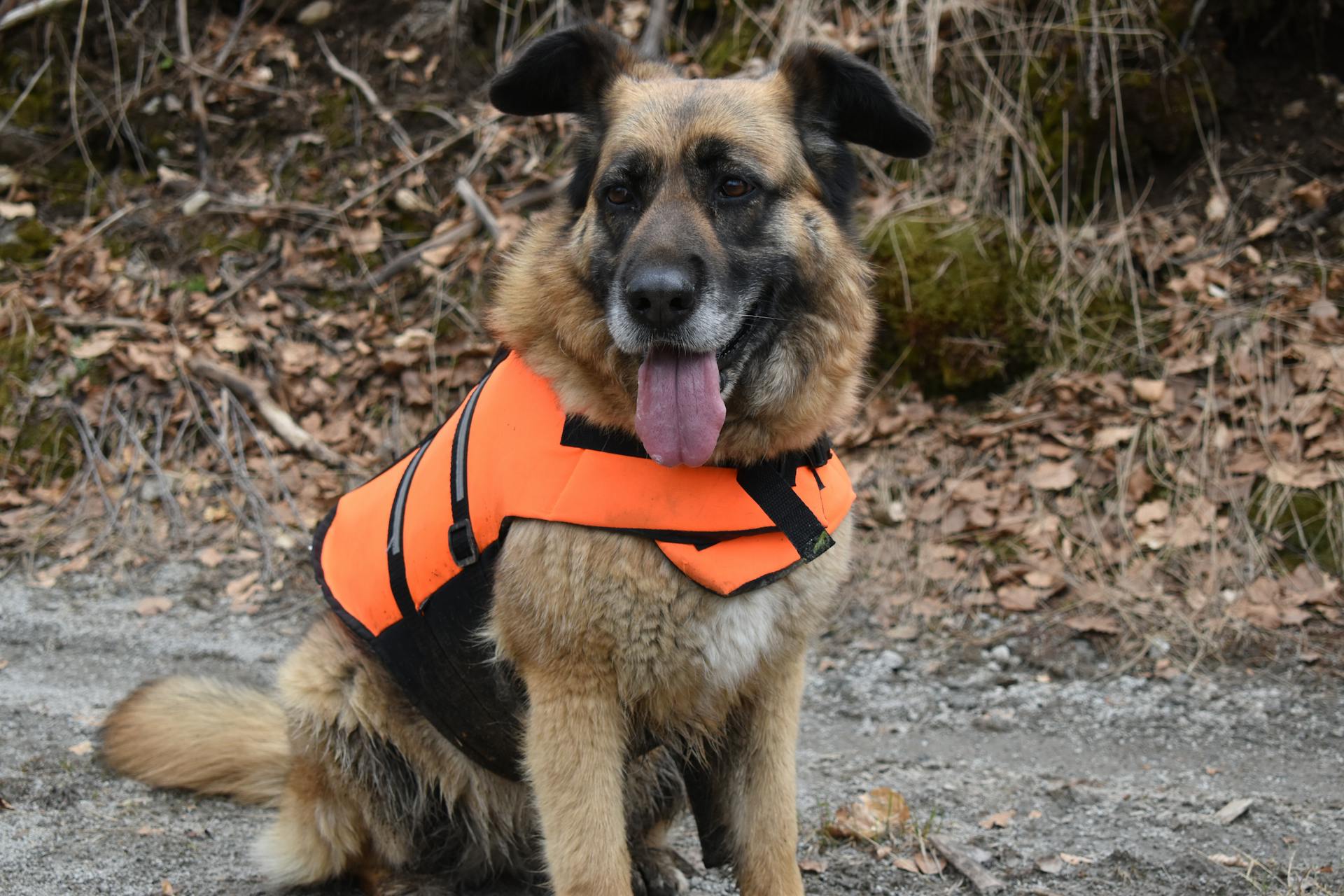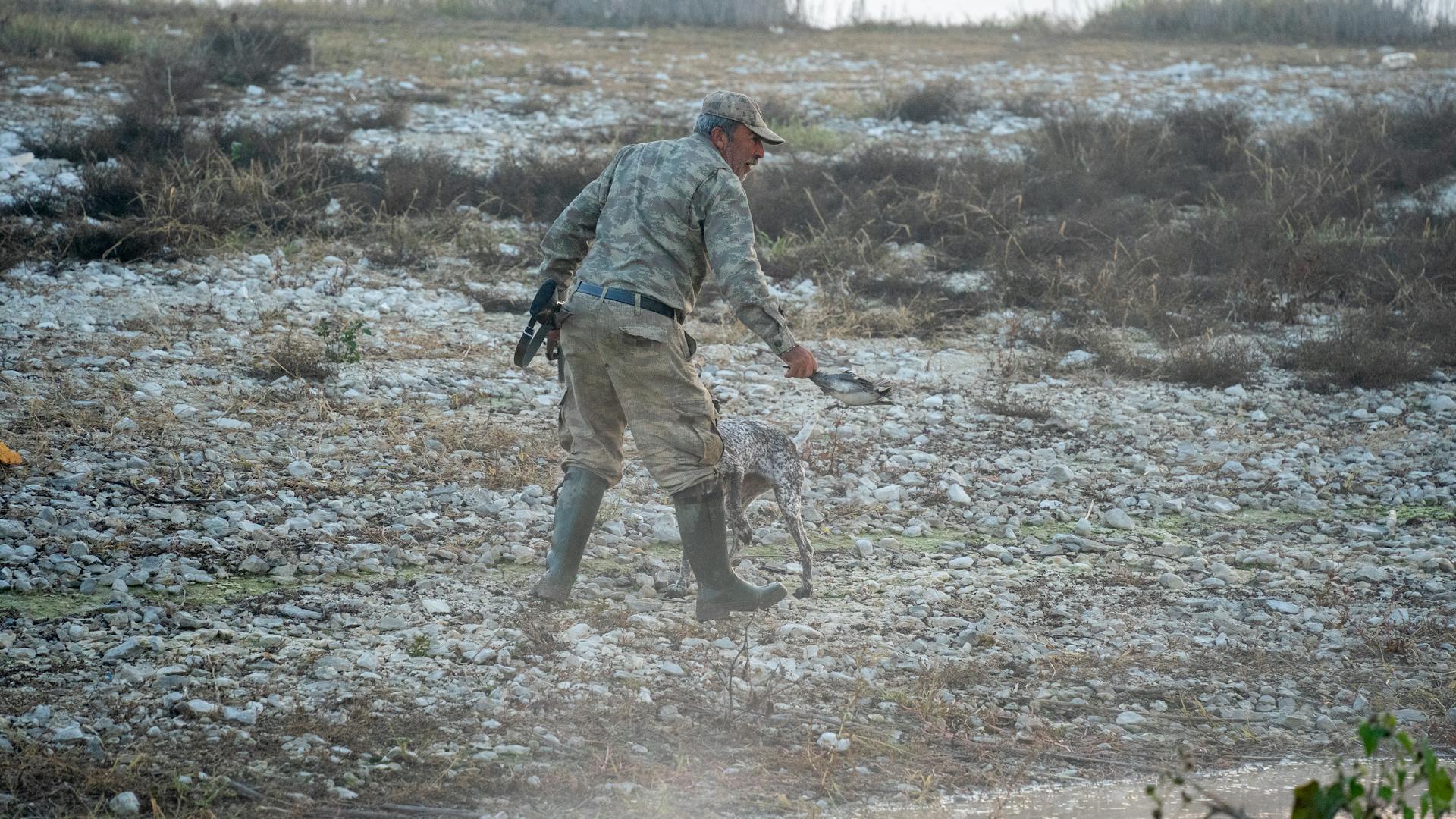
The Pudelpointer dog is a unique and versatile breed that's perfect for active families. This breed is a cross between a Poodle and an English Pointer, making it a great combination of intelligence, athleticism, and loyalty.
They are highly intelligent dogs that thrive on mental and physical stimulation. They need regular exercise and training to keep them happy and healthy.
Their short, smooth coats require minimal grooming, but they still need regular nail trimming and ear cleaning. They are generally a healthy breed with an average lifespan of 12-14 years.
Physical Characteristics
Pudelpointers are medium to large-sized dogs, typically weighing between 45 and 70 pounds.
They come in a range of sizes, with males standing 22 to 27 inches from the shoulder and females standing 21 to 26 inches tall.
Their coats can be wiry, smooth, or a mix of both, with a short undercoat and a longer outercoat. Some Pudelpointers have a lot of furnishings, like a beard and bushy eyebrows, while others have less.
The ideal coat is coarse, hard, and flat lying, with a topcoat of 4 to 6 cm and full facial furnishings. However, coat consistency has been an issue in the breed, and you may find a variety of coat types in a litter.
Here's a breakdown of the typical coat colors and types:
Their eyes are typically amber-colored, and they can have white markings, such as a patch on the chest.
Personality and Temperament
Pudelpointers are known for being calm, affectionate, intelligent, and eager to please. They have a very strong hunting drive and thus can be quite adventurous as well.
Despite their high energy level, Pudelpointers tend to be calm and thrives on snuggle sessions and lots of attention from their favorite human. They love to have a little fun while they work, but this frolicsome hunting attitude doesn't always carry over to home life.
One of the Pudelpointer's most prized personality traits is their eagerness to please. This hunting breed needs a human with a firm handle on training, but with some consistency early on, training your Pudelpointer should go smoothly.
Pudelpointers are highly cooperative and bond closely with their owners. They tend to be a bit mellower around the house compared to some of the other wire-haired breeds, and also said to have a playful almost clownish personality.
Their ability to fit seamlessly into a household, while maintaining their strong hunting instincts is one of the Pudelpointer's most desirable qualities. Tolerant of children, they will happily play with them, gladly 'going off' during their down time.
Pudelpointers can be prone to separation anxiety and does not do well if left alone for too long. They love to be outside and active, and will enjoy lounging in the house with their humans after a long day outside.
They are incredibly intelligent and trainable, especially when taught using positive reinforcement (think: rewarding them with treats and praise for desired behavior). Their strong hunting instinct gives them a lot of enthusiasm for playing fetch, both on land and in water.
Pudelpointers are friendly, inquisitive, and very social. They will quickly make their owner aware of any perceived intruder, barking to alert others of their presence.
Their prey instinct is strong in this breed and great care should be taken if attempting to house them alongside smaller pets, such as cats and birds.
Worth a look: Could Shiba Inu Hit $1
Health and Care
The Pudelpointer is generally a healthy breed, with a lifespan of 13-15 years. However, like all dogs, they can be prone to certain health issues.
Hip dysplasia and epilepsy have been reported in some Pudelpointers, and it's essential to be aware of these potential problems. Regular veterinary check-ups can help detect any health concerns early on.
Pudelpointers are high-energy dogs and can gain weight if they don't receive proper exercise. Aim for at least one half-hour to hour-long walk per day, along with a few active play sessions and shorter walks.
Here are some common health issues to be aware of in Pudelpointers:
- Hip Dysplasia
- Cancer
- Lymphedema
- Entropion
- Von Willebrand’s Disease
- Gastric Dilatation-Volvulus (GDV)
- Cryptorchidism
It's also essential to keep up with your Pudelpointer's dental care, as they can be prone to dental issues. Brush their teeth daily, and trim their nails regularly to prevent overgrowth.
Health Issues
The Pudelpointer is generally a healthy breed, but like all dogs, they can be prone to certain health issues. They are known to be susceptible to hip dysplasia, which can range from mild to severe cases.
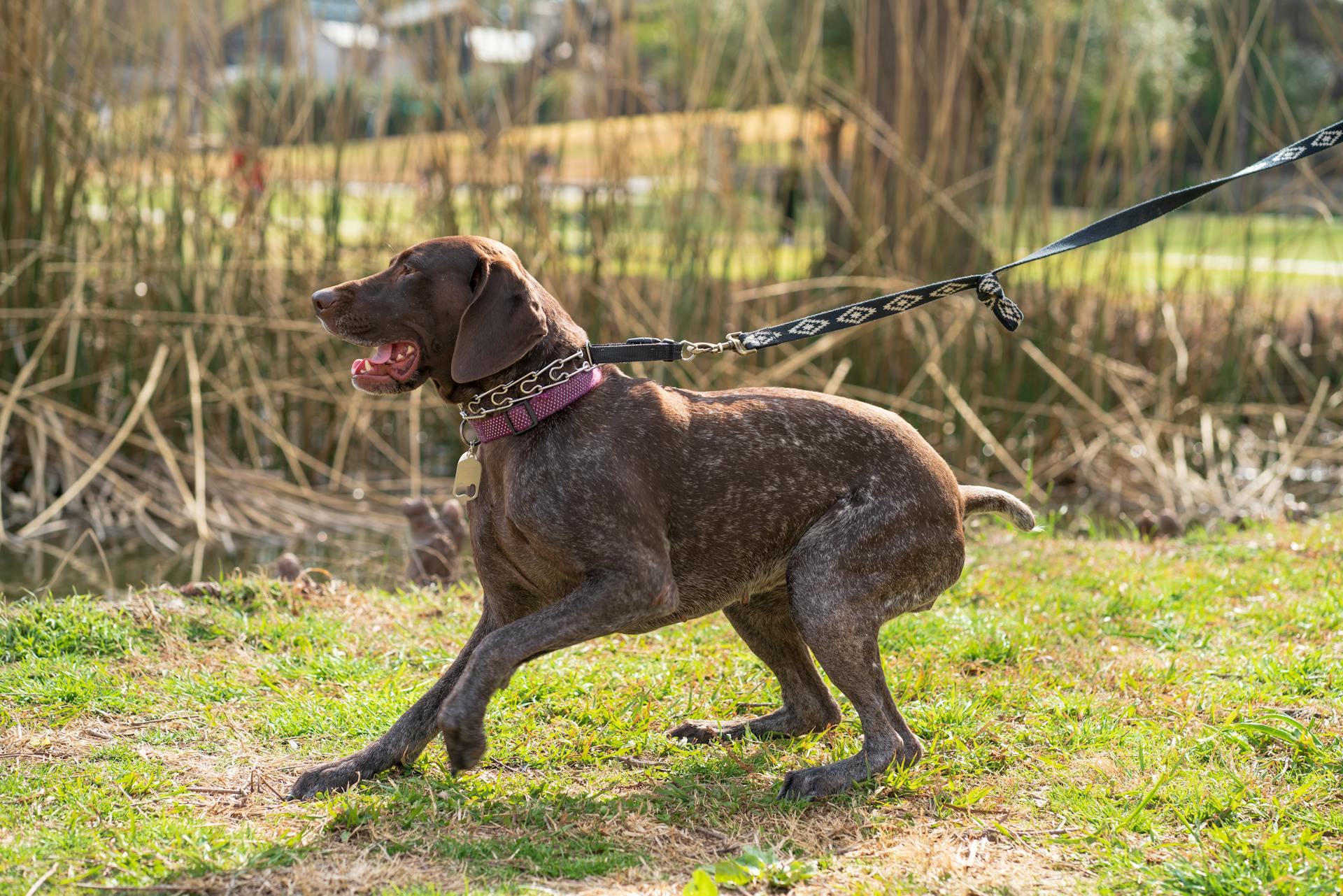
Hip dysplasia can be a significant concern, especially for breeding purposes. In severe cases, surgical intervention may be necessary.
The Pudelpointer's FCI standard emphasizes the importance of preventing hip dysplasia and epilepsy in the breed. This is a notable aspect, as it highlights the breed's health considerations.
Some less common health issues that can affect Pudelpointers include cancer, seizures, diabetes, allergies, and eye problems like entropion. These conditions can be managed with proper care and attention.
Pet insurance is a good idea for Pudelpointer owners, as it can help account for unexpected vet visits and emergencies. This is especially important for working dogs like the Pudelpointer.
Here are some common health issues that can affect Pudelpointers:
- Hip Dysplasia
- Cancer
- Seizures
- Diabetes
- Allergies
- Eye problems (e.g. entropion)
Pudelpointers typically live for 13-15 years, making them a long-lived breed. With proper care and attention, they can lead happy and healthy lives.
Care
Pudelpointers are generally healthy, but like all dogs, they can be prone to certain health issues. They can suffer from hip dysplasia, which is a condition where the hip joint doesn't develop properly, and cancer, including mammary tumors, mast cell tumors, and lymphosarcoma.
Check this out: Hip Dysplasia Bernese Mountain Dog
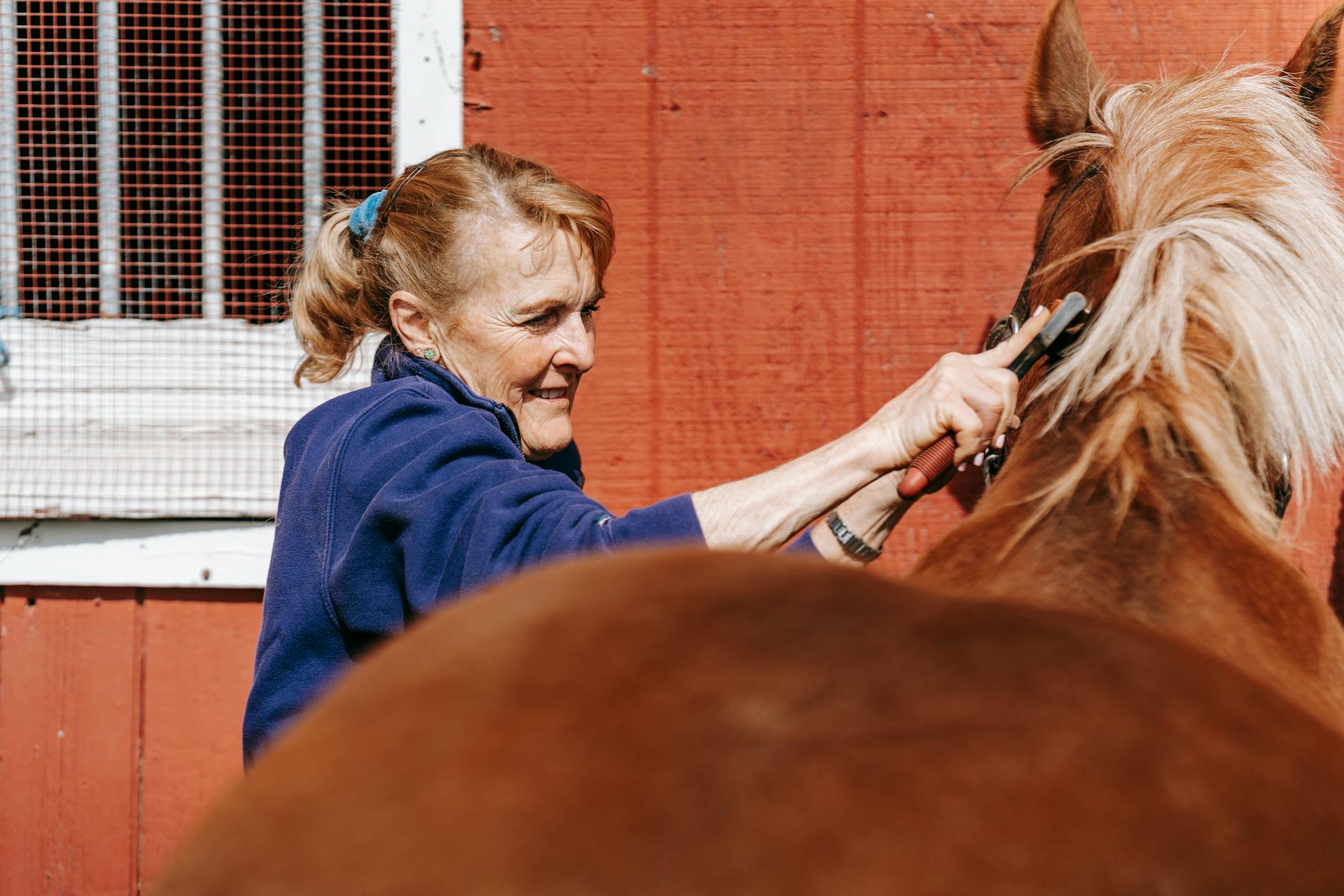
Regular veterinary checkups are essential to detect any health concerns early. Your vet can help you develop a care routine that will keep your Pudelpointer happy and healthy.
Pudelpointers are high-energy dogs and can be prone to weight gain if they don't receive proper exercise. They need at least one good half-hour- to hour-long walk per day, as well as a few active play sessions and shorter walks mixed in.
Daily ear cleaning and nail trimming are also crucial to prevent infections and keep your Pudelpointer's overall health in check. Brushing their teeth daily can help prevent dental issues.
A weekly combing session and occasional baths are enough to keep your Pudelpointer's coat looking its best. They shed very little, but seasonally they shed out their coats, so be prepared for some extra grooming during these times.
Here's a quick rundown of your Pudelpointer's grooming needs:
- Brush their coat once a week
- Bathe occasionally
- Brush their teeth daily
- Trim their nails regularly
- Clean their ears when needed
Pudelpointers are also prone to Gastric Dilatation-Volvulus (GDV), also known as bloat or torsion, so it's essential to feed them in a way that prevents this condition. Feeding them twice a day and avoiding large meals can help reduce the risk of GDV.
By following these care tips, you can help keep your Pudelpointer happy and healthy for years to come.
Training and Behavior
Pudelpointers are generally easy to train, thanks to their eager-to-please nature. They thrive on positive reinforcement and praise.
They are highly trainable, able to learn complex tricks and sports like agility with minimal reminders. A moderate training approach is usually sufficient, but they can handle some force if needed.
Pudelpointers have a high energy level, requiring at least an hour of exercise per day, and often more. They need physical and mental stimulation, such as puzzle toys or training, to prevent boredom and destructive behavior.
Their intelligence and athleticism make them well-suited for dog sports like agility, obedience, or rally.
Related reading: Border Collie Dog Agility
Training
Pudelpointers are generally eager-to-please hunting dogs with a lot of desire. Most are fairly easy to train, but some can have a stubborn streak.
They can handle some force quite easily, but moderate training methods are usually sufficient. Positive reinforcement works really well with this breed.
Early socialisation is key, exposing this dog to a variety of people, animals, noises and events to help build their confidence. They are highly motivated by both praise and food.
Pudelpointers are known for being easy to train. They are smart and athletic, and can learn a variety of skills, including complex tricks and sports like agility.
They retain what they have learned with minimal reminders, making them a dream to train.
Intriguing read: Training My German Shorthaired Pointer
Training and Behavior
Training and behavior is a crucial aspect of owning a Pudelpointer. They have a high prey drive, which means they'll get excited by animals like squirrels, chipmunks, and rabbits.
Socialization during puppyhood is key to getting along with other pets, especially cats and small animals. It's not impossible to keep a Pudelpointer with a rabbit, but supervision is essential.
Pudelpointers tend to get along well with other dogs, especially since hunting dogs often work together. However, socialization with other dogs is still important.
Pudelpointers are moderate barkers, so you can expect them to bark when someone returns home or comes to visit. They may also bark at animals they see outside, especially if they're not socialized properly.
Broaden your view: Rhodesian Ridgeback Bark
Living with a Pudelpointer
Pudelpointers are happiest in a rural environment with a large yard, as they crave a large territory that offers a lot of activities and opportunities to hunt.
They will not live well in a city apartment, so if you're considering bringing a Pudelpointer into your family, make sure you have a spacious yard to accommodate their needs.
Expand your knowledge: Large Mountain Dogs
Pudelpointers thrive on human contact and should not be left alone for long periods of time, or they'll develop undesirable behaviors.
Frequent walks, swimming, and nature hikes with their family will keep them happy and engaged, and can even help to tire them out.
Pudelpointers are not suited to life in a kennel, where they would be alone and without human interaction, so if you're an outdoor enthusiast, consider adopting a Pudelpointer as a companion for your adventures.
They are a high-energy breed that loves to work, so be prepared to provide them with plenty of exercise and mental stimulation to keep them happy and healthy.
History and Development
The Pudelpointer was created by Baron von Zedlitz in the late 1800s to be the ultimate hunting dog. He bred the German Pudel with the English Pointer to produce a dog that could swim, track scents, retrieve game, and not shy away from loud noises.
In 1881, the first Pudelpointer was bred, and over the next 60 years, breeders refined the breed to make it the versatile and loving companion we know today. The breed was meant to have the intelligence and trainability of a poodle, the retrieving instincts of a pointer, and a protective coat.
The Pudelpointer's breeding stock was rebuilt after World War I and World War II, and pointers were again bred into the line in greater numbers than poodles. This helped to maintain the breed's pointing instincts, birdiness, and endurance.
In 1956, the first Pudelpointers were brought to North America by Sigbot "Bodo" Winterhelt, a German native who helped create the standard for hunting dogs. He was instrumental in showcasing the Pudelpointer as an eager-to-please hunting companion.
The Pudelpointer was developed to be a multi-purpose hunting dog, capable of working on land and water. It was bred to hunt a variety of game, including birds, rabbits, and larger game.
Additional reading: Largest Tibetan Mastiff Ever Recorded
General Information
The Pudelpointer is a versatile hunting dog that excels in both upland and waterfowl hunting.
Developed in the 19th century in Germany, this breed combines the traits of Poodle and English Pointer breeds, making it a unique and valuable companion.
The Pudelpointer's medium to large size, with a height range of 18-24 inches and a weight range of 40-70 pounds, makes it suitable for various terrains and hunting tasks.
Its well-muscled and athletic build is a testament to its agility and endurance in the field.
The breed's coat is dense and water-resistant, coming in a variety of solid colors, which provides protection during waterfowl hunting.
Here are some key characteristics of the Pudelpointer breed:
- Height: 18-24 inches
- Weight: 40-70 pounds
- Coat: Curly, wavy, or wiry
- Colors: Brown, white, black, liver, apricot, and various combinations
The Pudelpointer's friendly disposition and eagerness to please its owner make it a suitable family companion and a valuable hunting partner.
Rescue and Clubs
If you're interested in getting involved with the Pudelpointer community, there are several clubs and organizations you can join. The parent club for the breed in Germany is the Verein Pudelpointer, and they have a counterpart in North America called the Verein Pudelpointer Club Group of North America.
Broaden your view: American Kennel Club Lancashire Heeler
You can also look into clubs in other countries, such as Austria and France. In North America, there are three associations for the breed: The Pudelpointer Club of North America (PCNA), The Canadian American Pudel-pointer Association (CAPA), and The North American Pudelpointer Alliance (NAPPA).
Here are some Pudelpointer clubs and organizations you can look into:
- Verein Pudelpointer
- Verein Pudelpointer Club Group of North America
- Pudelpointer Club of North America (PCNA)
- Canadian American Pudel-pointer Association (CAPA)
- North American Pudelpointer Alliance (NAPPA)
Rescue Groups
Rescuing a Pudelpointer can be a bit tricky since they're not a super common breed. However, you can try checking with local shelters, or look into rescues that help all kinds of dogs.
You might also want to consider rescues specifically dedicated to Pointer breeds, as they may have Pudelpointers available for adoption.
If you're having trouble finding a Pudelpointer rescue group, don't give up! You can try searching online for groups like Wright-Way Rescue or Angels Among Us Pet Rescue.
Here are some rescue groups you can look into:
- Pudelpointer Rescue Groups
- Wright-Way Rescue
- Angels Among Us Pet Rescue
- Mid-Atlantic German Shorthaired Pointer Rescue
- NorCal GSP Rescue
- GSP Rescue of Wisconsin Home Page
- German Shorthaired Pointer Rescue Pennsylvania
- The California German Shorthaired Pointer Rescue
Clubs
There are several clubs dedicated to the Pudelpointer breed. The Verein Pudelpointer is the parent club in Germany, and they have a counterpart in North America called the Verein Pudelpointer Club Group.
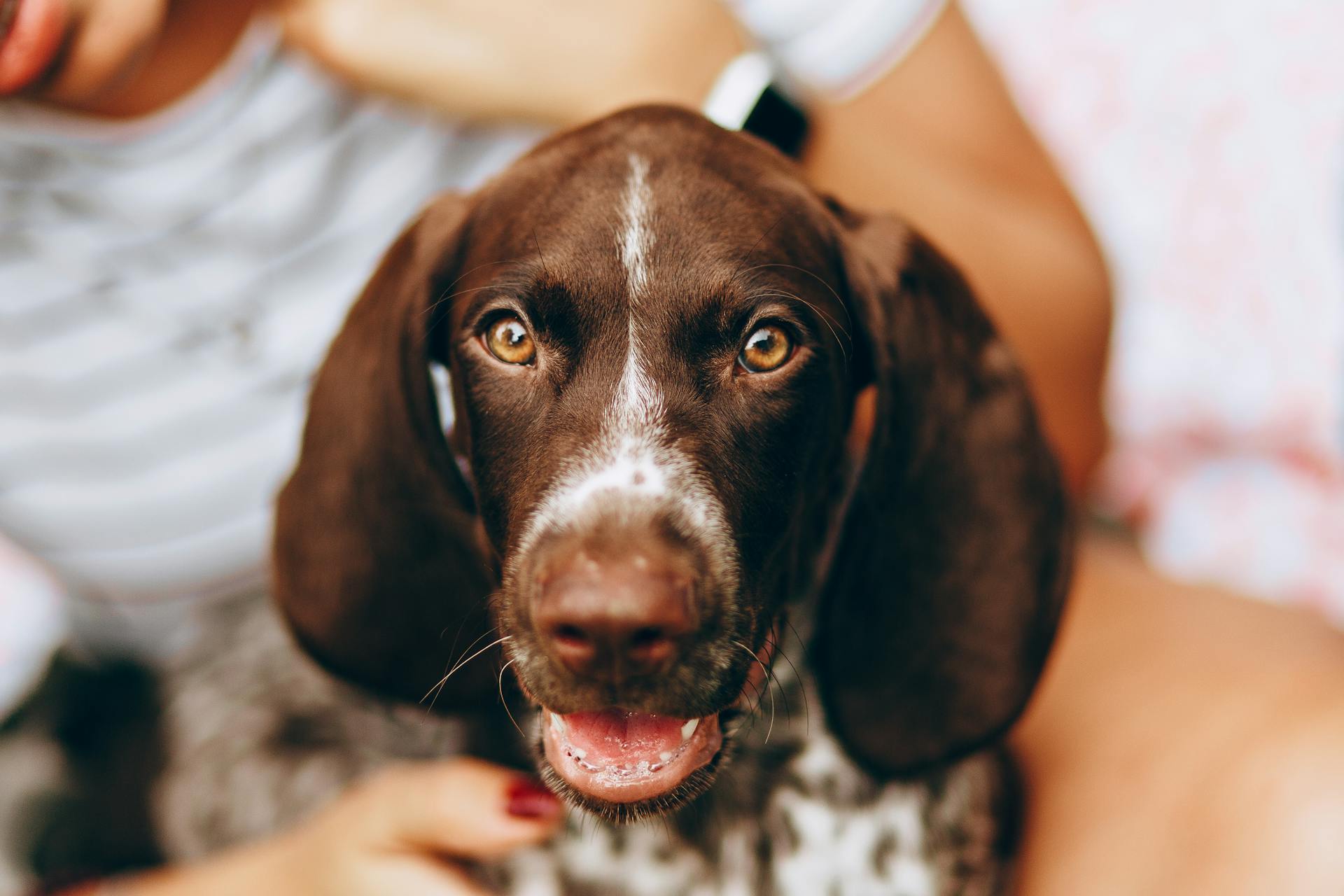
The Verein Pudelpointer Club Group of North America is one of the three associations for the breed in North America. The others are the Pudelpointer Club of North America (PCNA) and the Canadian American Pudel-pointer Association (CAPA).
The Pudelpointer Club of North America (PCNA) is one of the associations for the breed in North America. The North American Pudelpointer Alliance (NAPPA) is an alliance of Pudelpointer breeders who test their dogs in NAVHDA and agree to maintain certain breeding standards.
The Verein Pudelpointer Club Group of North America, PCNA, and CAPA all work together to promote and preserve the Pudelpointer breed.
Consider reading: One Eyed Shih Tzu
Frequently Asked Questions
Are pudelpointers rare?
Yes, pudelpointers are a rare breed, with only around 150 puppies born each year. Despite their hunting abilities, they remain a relatively uncommon breed.
Is a Pudelpointer hypoallergenic?
Pudelpointers may be a good option for those with dog allergies, as some owners report no reaction despite allergies to other breeds. However, individual results may vary
Is a pudelpointer a good family dog?
Pudelpointers are generally good with young children due to their patient and tolerant nature, making them a suitable breed for families with kids
Is a pudelpointer a good duck dog?
Yes, a pudelpointer is a good duck dog due to its versatility and ability to adapt to various hunting scenarios. They are a valuable asset for waterfowling enthusiasts.
Are Pudelpointers aggressive?
Pudelpointers are known for their calm temperament and show no aggression towards people or other dogs. However, socialization with other pets is crucial to ensure a harmonious household.
Featured Images: pexels.com
